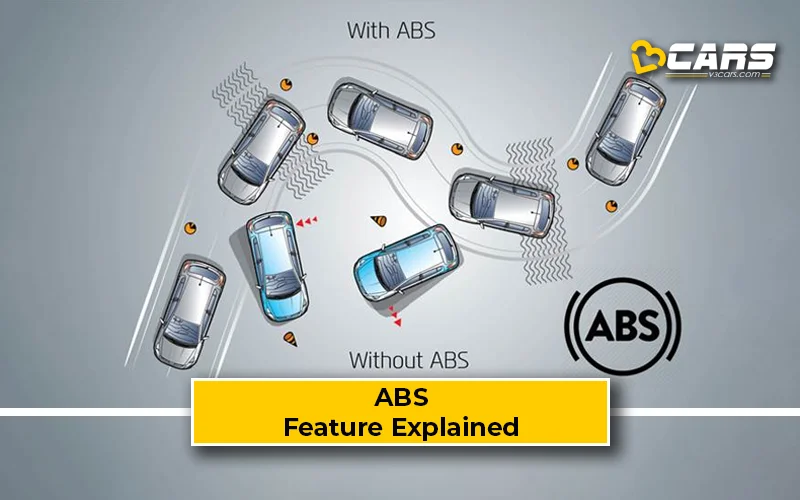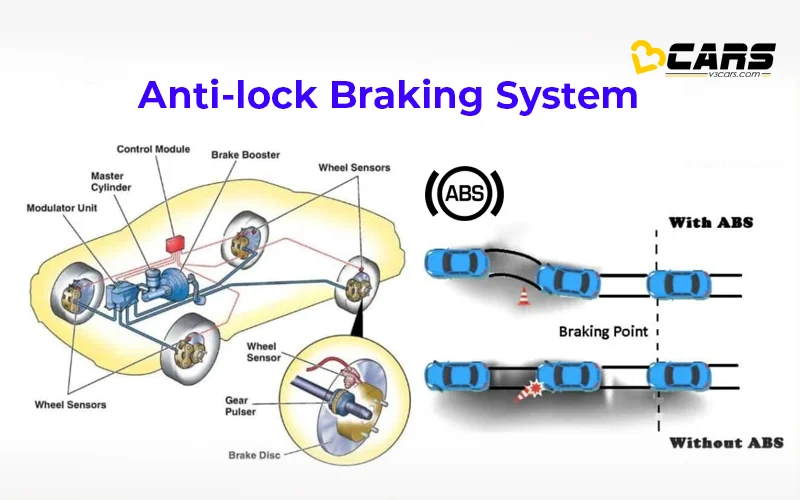ABS Or Anti Lock Braking System – V3Cars Feature Explained
Ever slammed on the brakes and felt the brake pedal suddenly drop, followed by a rapid pulsing sensation? That’s your car’s Anti-lock Braking System (ABS) kicking in. This crucial safety feature helps you maintain control during emergency braking by preventing wheel lockup. Let's dive into the world of ABS and how it keeps you safe on the road.

What Is ABS Or Anti-Lock Braking System?
ABS is an electronic safety system that prevents the wheels of a vehicle from locking up during hard or sudden braking. Locked wheels can cause skidding, resulting in loss of traction and steering control. ABS allows the wheels to maintain rotation, even under heavy braking, enabling you to steer around obstacles and stop more effectively. It's a vital component in modern vehicles, significantly enhancing safety in challenging driving conditions.
How Does ABS Work In A Car?
ABS relies on a sophisticated interplay of sensors and actuators:
- Wheel Speed Sensors: These sensors, located at each wheel, constantly monitor the rotational speed.
- Electronic Control Unit (ECU): This is the “brain” of the ABS. It receives data from the wheel speed sensors and analyzes it for signs of impending wheel lockup.
- Hydraulic Modulator: This unit controls the brake fluid pressure to each individual wheel, acting on instructions from the ECU.
Here's how the system works during emergency braking:
- Lockup Detection: When you brake hard, the ECU detects a rapid deceleration of one or more wheels, indicating an imminent lockup.
- Pressure Modulation: The ECU instructs the hydraulic modulator to rapidly reduce brake fluid pressure to the affected wheel(s). This prevents the wheel from completely locking.
- Traction Regained: By reducing the braking fluid pressure, the wheel regains some rotational speed, maintaining traction and allowing you to steer.
- Pulsating Feedback: You feel a pulsing sensation in the brake pedal as the system rapidly adjusts the brake pressure. This is normal and indicates the ABS is working.

This cycle of pressure reduction and release happens multiple times per second until you release the brake pedal or the vehicle comes to a complete stop.
Note: Now find out the Fuel Price In India using V3Cars
What Are The Pros And Cons Of ABS?
Advantages of ABS:
- Enhanced Safety: ABS helps you maintain steering control during emergency braking, enabling you to avoid obstacles that might otherwise lead to a collision. This is especially crucial in slippery conditions or panic situations.
- Shorter Stopping Distances (on specific surfaces): On loose surfaces like gravel, snow, or wet roads, ABS can prevent wheels from digging in and actually reduce stopping distances compared to locked wheels.
- Improved Vehicle Stability: By preventing wheel lockup, ABS helps maintain vehicle stability, reducing the risk of skidding and loss of control.
- Reduced Driver Fatigue: ABS eliminates the need for “threshold braking” (pumping the brakes), which can be tiring for the driver during prolonged hard braking situations.
Disadvantages of ABS:
- Increased Stopping Distances (on dry pavement – sometimes): On dry, paved surfaces, ABS might slightly increase stopping distances in some situations compared to perfect threshold braking. However, perfect threshold braking is extremely difficult for most drivers to achieve consistently. ABS provides more consistent and safer stopping for the average driver.
- Less Effective on Very Uneven Terrain: On extremely rough or uneven surfaces, ABS may not be as effective due to the complex interactions between the wheels and the terrain. However, it still provides a safety benefit in most cases.
- Cost of Repair: While generally reliable, ABS components can be expensive to repair or replace if they malfunction. This is a trade-off for the added safety it provides.
Can ABS Be Fitted From The Aftermarket?
While technically possible in some cases, adding ABS to a car that wasn’t originally equipped with it is generally not recommended. Modern ABS systems are complex and integrated with other vehicle systems. The installation process is intricate and requires specialised tools and expertise. Improperly installed aftermarket ABS can compromise safety and could even create new hazards.
What Is The Procedure To Install ABS From The Aftermarket?
Due to the complexity and safety implications, it’s highly advisable not to attempt aftermarket ABS installation. The procedure would involve:
- Obtaining all necessary ABS components (sensors, ECU, hydraulic modulator, wiring harness, etc.) compatible with the specific vehicle.
- Modifying the vehicle’s braking system, including potentially replacing brake lines and master cylinder.
- Integrating the ABS system with the vehicle’s electrical system.
- Programming and calibrating the ABS system.
This is a job best left to trained professionals, and even then, it’s often not a viable or cost-effective option.
Affordable Cars In India That Offer ABS
In India, ABS is a standard safety feature on all cars sold since April 1, 2019. Therefore, all new cars offer ABS. When looking at used cars, it’s a good idea to prioritise models with ABS. Many affordable cars across various segments offer ABS as standard or as an option. Checking the specific model and variant is always recommended.
Note: Instantly sell your old car with V3Cars Sell Used Car platform
Also Read: Hill Start Assist Or Hill Hold Control – Feature Explained


0 Comments